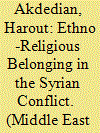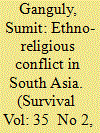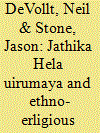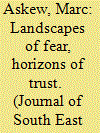| Srl | Item |
| 1 |
ID:
169372


|
|
|
|
|
| Summary/Abstract |
Based on research conducted between 2011 and 2014 on how Syrians experience, interpret, and redefine ethnic and religious-based differences, this article explores the dynamics that have made sectarianism such a salient feature of the Syrian conflict. Two distinct forms of sectarianism are simultaneously at work: a preexisting ethno-religious communitarianism and a more recent, dehumanizing sectarian outlook that emerged during the conflict. While the two are correlated, they are outcomes of different processes and conditions. As a byproduct of the Syrian conflict, sectarianism can thus neither be deemed the outcome of a process superseding the conflict nor the expression of preexisting conditions.
|
|
|
|
|
|
|
|
|
|
|
|
|
|
|
|
| 2 |
ID:
016076


|
|
|
|
|
| Publication |
Summer 1993.
|
| Description |
88-109
|
|
|
|
|
|
|
|
|
|
|
|
|
|
|
|
| 3 |
ID:
081825


|
|
|
| 4 |
ID:
089371


|
|
|
|
|
| Publication |
2009.
|
| Summary/Abstract |
Thai Buddhist and Malay Muslim neighbours in Thailand's Muslim-majority deep south face the challenge of managing everyday life in the midst of an enigmatic insurgency where both ethno-religious groups are victims of violence, but where the assailants are difficult to identify. This ethnographically-focused paper examines horizons of trust and suspicion as villagers confront threats to their safety, negotiate state authorities and encounter broader narratives about identity, allegiance and enemies. Although fear and suspicion sparked by the current violence have generated Buddhist-Muslim tensions in localities, neighbourhoods and village leaders also actively resist the multiple threats to their relationships and to inter-ethnic coexistence.
|
|
|
|
|
|
|
|
|
|
|
|
|
|
|
|